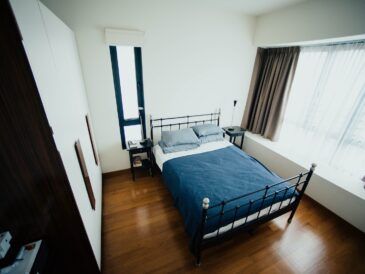Sleeping on your stomach can be an effective and convenient sleeping position; however, it may cause pain in your back and neck which could prevent restful nights’ rest. In this situation, frequent awakenings occur and difficulty with getting an uninterrupted night’s rest is experienced.
Sleeping on your stomach can be hard on both your back and neck as it makes maintaining an ergonomic spine position more challenging, not to mention placing undue strain on shoulders.
Sleeping on your stomach can cause back pain.
Sleeping on your stomach puts great strain and pressure on the middle of the spine, as well as forcing it out of its natural alignment, leading to backache and stiffness upon awakening. Furthermore, this position tilts your head to one side for extended periods, potentially causing neck or shoulder pain as your head tilts in that direction.
Many people who sleep on their stomach turn their head to one side to breathe, which places unnecessary strain on neck muscles and may lead to headaches and shoulder pain. Furthermore, extending one’s neck can compress their spine, leading to back and neck discomfort.
Stomach sleeping often results in hip sinkage, placing stress on the lower spine and pelvis. Furthermore, legs may slant forward putting additional strain on knees and hips.
There are ways to both improve and alleviate pain while sleeping. A firm mattress will help avoid hip sinkage while ensuring your spine stays in its ideal position while you rest, while adding a thin pillow underneath your head may prevent neck twisting that leads to back and shoulder ache.

Sleeping on your stomach can cause neck pain.
Stomach sleeping can strain your neck by forcing you to keep your head tilted in one direction for long enough. This causes pressure on the spine, creating discomfort and stiffness.
Stomach sleeping may also hinder breathing by restricting you from fully expanding your lungs, leading to reduced oxygen levels in the blood and leading to fatigue and sleepiness during the day.
If you are a stomach sleeper, try switching up your habits. Sleep on either your back or side which are considered better positions for your spine and back. Incorporating a pillow under your pelvis as this may aid with spinal alignment and decrease neck strain.
Use a firmer mattress to prevent sinkage beneath your hips, the primary cause of lower back pain when sleeping on your stomach. Add a thinner pillow to reduce any angles between your head and neck during restful slumber – the flatter it is, the less angles there will be between head and neck during restful sleep. If your neck hurts when sleeping on its side, light stretching may help ease pain; or consult with your physician regarding their advice to improve sleep based on medical history.
Sleeping on your stomach can cause hip pain.
Sleeping on your stomach (commonly referred to as the prone position) can lead to hip pain and other health problems, including digestion issues and increased acid reflux, and put added strain on the lower back and neck muscles. Furthermore, this sleeping position has also been linked to labral tears. To avoid these health risks and injuries, side sleeping offers similar benefits while still offering quality restful restful zzz’s!
If you are a stomach sleeper, slowly shift towards another sleeping posture by gradually switching positions at night. A thin pillow under your pelvis may help align your spine and decrease back pain when sleeping on your stomach.
Stomach sleeping places undue strain on your hips and can increase the risk of conditions like greater trochanteric pain syndrome, hip bursitis and gluteal tendinopathy. This occurs because sleep positions like tummy sleeping that place the knee higher than the hip can irritate a fibrous area called the labrum that lines your joint socket lining which becomes inflamed due to sleep positions such as tummy sleeping that raise the knee more than your hip joint socket lining which forms into a fibrous labrum area that can become inflamed during restless sleep positions such as tummy sleeping which irritates this joint socket-labrum connection that forms when joint socket-lined smooth cartilage lines the joint socket-a fibrous area called Labrum which becomes inflamed from sleep positions such as tummy sleeping which places knee higher than hip joint socket lining that forms into fibrous area called labrum irritable due to stress-positioning sleeping positions where knees higher than hip joint socket.
Relying solely on stomach sleeping poses another drawback, in that the head and neck become tilted to one side over time, twisting your neck in unintended ways and leading to soreness or, worse yet, serious health concerns such as herniated discs.

Sleeping on your stomach can cause shoulder pain.
Sleeping on one’s stomach places additional strain on both spine and neck, leading to discomfort upon awakening. This could be caused by improper spinal alignment, stiff shoulders or unsupportive pillows – among others.
If you prefer sleeping on your stomach, try going without or using a thin pillow which doesn’t force your neck into an unnatural position. Stomach sleeping often forces the neck to rotate in one direction for most of the night – which can strain shoulder muscles and lead to tension and pain in those sleeping this way.
An extra pillow under your head may help prevent this, provided it doesn’t exceed a certain height limit. An excessively tall pillow could cause your head to tilt towards it, placing undue strain on both neck and spine.
Stomach sleeping can exacerbate shoulder and back pain and create issues with the rotator cuff tendons that hold your shoulder joint in place, leading to numbness, tingling or pain in your neck, back, upper arms or upper body. In addition, lying flat puts pressure on the stomach which causes its contents to flow backward into your esophagus, potentially resulting in heartburn symptoms as well.




